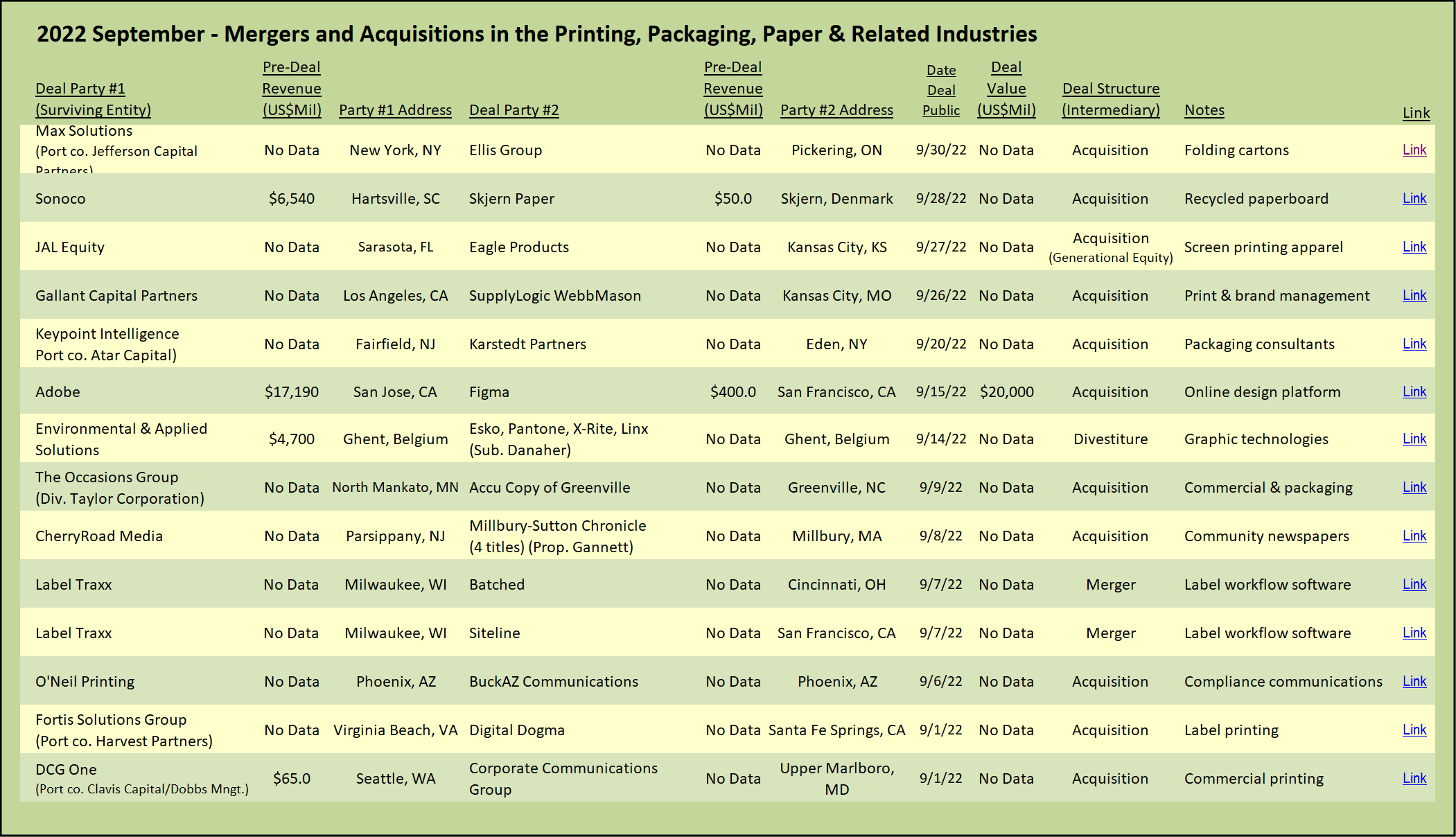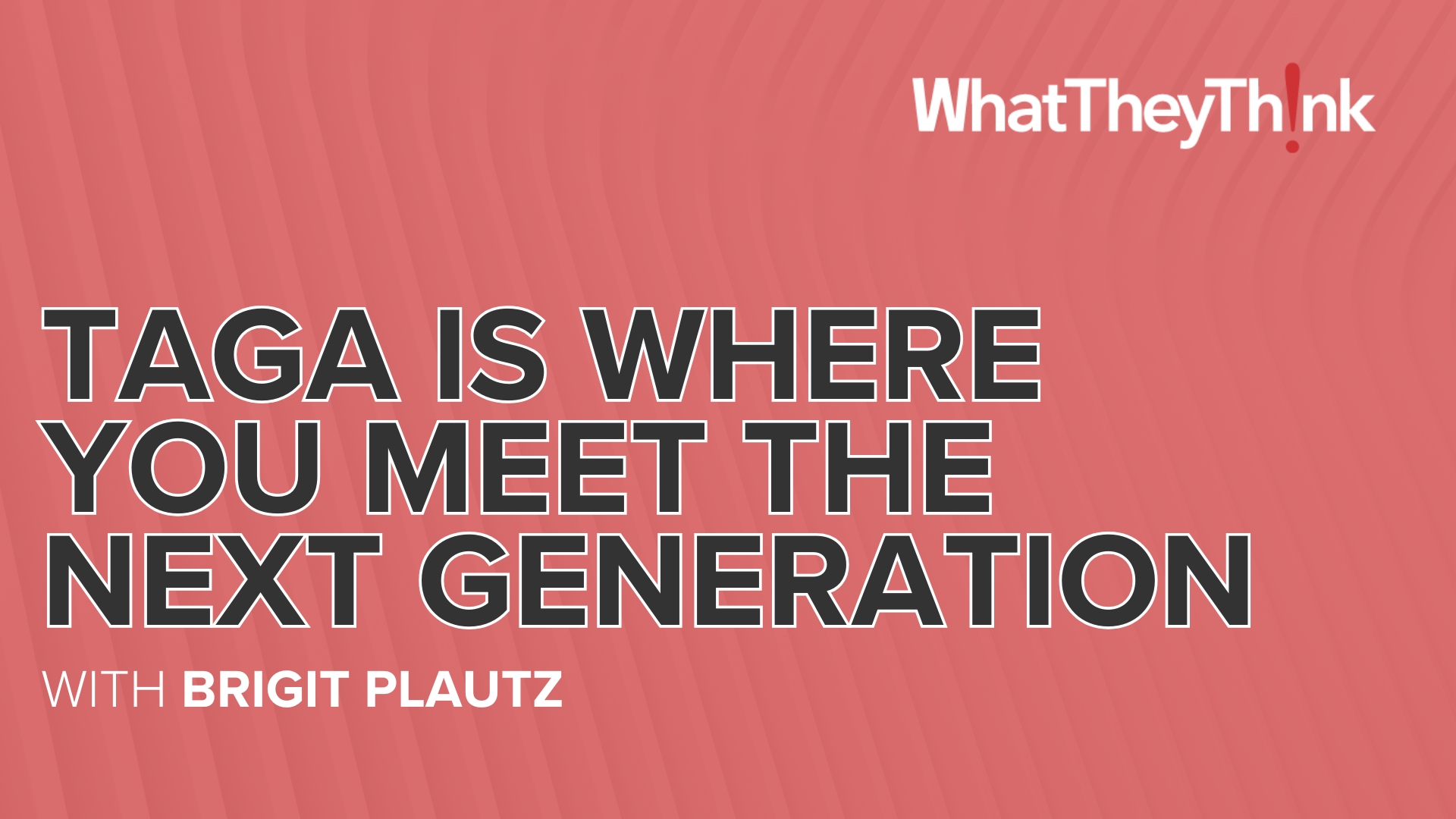
The consolidation of the printing and packaging industry continues to pick up momentum as new financial players enter the field. The new contenders, mostly private equity firms with backing from multiple investors, usually move into an industry segment with an initial acquisition, a transaction that drives a stake in the ground, a deal that announces their intention to invest in and grow a business in that specific sector. That first foray into the particular business segment is likely to be a company that has sufficient size and profitability to be used as a launching pad for further acquisitions. From that initial platform investment, the investment firms aggressively seek out and complete multiple sequential bolt-on acquisitions to expand their footprint in the targeted market.
This trend has been most evident and prevalent in the label and flexible packaging segments where the PE-backed frenzy has, over the past several years, reached a fever pitch of activity. Multiple private equity buyers vying to build out their platforms to achieve significant market gravitas has led to sky-high purchase multiples for label printing companies, at least judged within the value context of the overall printing and packaging industry segments.
As we have noted in previous Target Reports, our expectation has been that PE-driven consolidators would become interested in other print-centric segments, especially the manufacture of folding cartons. Similar to labels and flexible packaging, folding carton manufacturing is characterized by recurring revenues, strict color management, adherence to a variety of technical requirements related to the industry vertical being served, and a constant proliferation of brand extensions which requires continuity of customer interaction. These industry features are attractive to private equity firms that operate in the lower middle market, exactly the level of many family-operated privately-owned folding carton companies.
Unlike labels and folding cartons, the level of M&A activity in the commercial printing arena has been much quieter for several years. Commercial printing has a much higher dependence on the ebb and flow of marketing budgets. Internal production in commercial print environments is characterized by the staccato rhythm of job-shop workflows. Commercial print has been and is increasingly challenged by the ongoing transition of marketing communications to electronic media. As a result of these factors, M&A activity and enterprise values in the commercial printing segment have lagged behind the other print segments, with fewer competing buyers and lower purchase multiples. Critically, in today’s market-driven dynamic that is highly influenced by private equity, the financial players stayed on the sidelines and avoided the more generalized commercial segments of the printing industry.
There are signs of change. Several financial players have now emerged to sponsor significant platforms within the general commercial segment. However, commercial printing company owners should not confuse the appearance of a select few private equity funds in the segment with a return to the robust market and higher valuations that characterized the market for commercial printing companies in the nineteen-nineties. The private equity players entering the commercial printing segment have been mostly very selective, acquiring successful profitable companies with diverse service offerings including upstream creative services and multi-channel delivery of their customers’ communications. Run-of-the-mill commercial printing companies need not apply.
Folding Carton Veterans Get Back in the Game
Industry icons Marc Shore and Dennis Kaltman are back, establishing a brand-new platform company. Leaving no doubt about their intentions to be serious players as they return to the industry, the duo is heading up a new company, Max Solutions, with backing from private equity firm Jefferson Capital Partners. Shore and Kaltman worked together at Shorewood packaging and were supported by Jefferson Capital Partners in the formation of Multi Packaging Solutions, a highly successful folding carton roll-up that was eventually sold to Westrock, the massive publicly-traded paper and paperboard manufacturing company.
Rather than start with the acquisition of an existing production company, Max Solutions began by establishing two brand new manufacturing plants focused on production of folding cartons and labels for the health care and consumer markets. The first plant to open, a 100K square-foot facility in Bristol, Pennsylvania, began operations in July. The second, also a new plant, is a 150K square-foot factory in Concord, North Carolina, and is slated to open this month.
The company announced its first acquisition, the purchase of Ellis Group, Canada’s largest family-owned and operated folding carton company. The acquired company operates three facilities in the Toronto region. In addition to sheetfed offset capabilities, the company utilizes web-fed flexographic presses designed specifically for high-volume folding carton production.
Another entrant into the contest to consolidate the folding carton market is GPA Global, with financial backing from Sweden-based private equity firm EQT Partners. GPA Global has built up a network of folding carton plants, layered on top of the company’s core outsourcing expertise, including plants in Poland, Ireland, the United Kingdom, as well as US-based factories in Massachusetts and California (see GPA Global Emerges as Packaging Consolidator – December 2021 M&A).
The PE-backed roll-up of Oliver Printing & Packaging, sponsored by Pfingsten Partners, was recently traded out in a secondary buyout to Tenex Capital. Pfingsten established the platform in 2016 with the purchase of Cleveland area-based Oliver Printing, at the time a commercial printing company that had successfully transitioned a substantial portion of its business to folding carton production. Building on that initial base, Pfingsten acquired multiple folding carton companies, including Pohlig Packaging in Virginia, Boutwell Owens in Massachusetts, Professional Image in Oklahoma, and DISC Graphics in Hauppauge, New York where the company is now headquartered.
Other PE-backed players consolidating the folding carton segment include Radial Equity Partners with the Lewisburg Printing platform, Mill Rock Capital’s Mill Rock Packaging roll-up, and Wellspring Capital’s Rohrer. (For more, see Label Roll-Ups are Red Hot; Are Folding Cartons Next? – March 2022).
Commercial Printing Roll-Up Redux (Marketing Production Providers)
DCG One, based in Seattle, Washington, acquired Corporate Communications Group (CCG), based in Upper Marlboro, Maryland. Notably, DCG One bills itself as a “marketing services organization” and described its acquisition target as an “integrated commercial print and direct marketing company.” While neither company shies away from promoting their roots in the printing industry, nonetheless both DCG One and CCG clearly present their printing capabilities within the framework of a broad range of capabilities. In addition to print, the combined organization offers strategic marketing, creative design services, web design, grand format printing, promotional products, digital media marketing, fulfillment, direct mail services, and oh yes, printing.
DCG One has been backed by Clavis Capital Partners and Dobbs Management Service since January 2020. The transformation into a marketing service provider was underway at the time of the purchase, and then accelerated with the acquisition of the Garrigan Lyman Group, a branding and digital advertising agency with offices in Seattle and New York.
Post Capital Partners, a private equity fund that focuses first on its trust and belief in an experienced executive leadership team, and only thereafter will invest in a specific industry, continued its support of the team at Ironmark, with the acquisition of Millennium Marketing Solutions.* Based in Annapolis Junction, Maryland, Ironmark presents a comprehensive value proposition to its customers. With the moniker of an “Image Company,” Ironmark offers creative services, website design, database integrations, search-engine-optimization, web-to-print, digital media marketing, fulfillment, and oh yes, printing. (see Commercial Print Awakes from M&A Slumber – June 2022).
The purchased company, Millennium Marketing Solutions, is also based in Annapolis Junction, and over time transitioned from a small print shop into a full-service marketing firm. Areas of expertise include digital marketing, webpage design, graphic design, promotional products, signage, and oh yes, printing.
Labels Remain the Division One Segment
Labels continue to be the most sought-after segment, if gauged by the number of private equity consolidators that have been competing to pick up the diminished number of suitable independent label printing companies that remain in the lower middle market.
Fortis Solutions Group announced the acquisition of Digital Dogma, a label printing company based in Santa Fe Springs, California. Fortis is now backed by Harvest Partners which acquired the company in a secondary buyout from Main Post Partners in October 2021. Fortis has grown via acquisition from one small pressure sensitive label printing company in Virginia Beach to a national multi-product packaging manufacturer with over 1,300 employees across twenty-two plants.
Other active private equity players in the label segment include Incline Equity with platform company NovaVision, Quad-C Management with Catapult Print and Packaging, Dunes Point Capital with Premium Label & Packaging, Sole Source Capital with Peak Technologies, Genstar Capital with Brook + Whittle, Heartwood Partners with All American Label & Packaging, Morgan Stanley Capital with AWT Labels & Packaging, Sole Source Capital with I.D. Images, and Ares Management with Resource Label Group. And that is just the list of PE-backed platforms active in the label segment that have announced transactions in the first nine months of 2022!
* Graphic Arts Advisors, publisher of The Target Report, served as exclusive advisors to Millennium Marketing Solutions in this transaction.
View The Target Report online, complete with deal logs and source links for September 2022

















